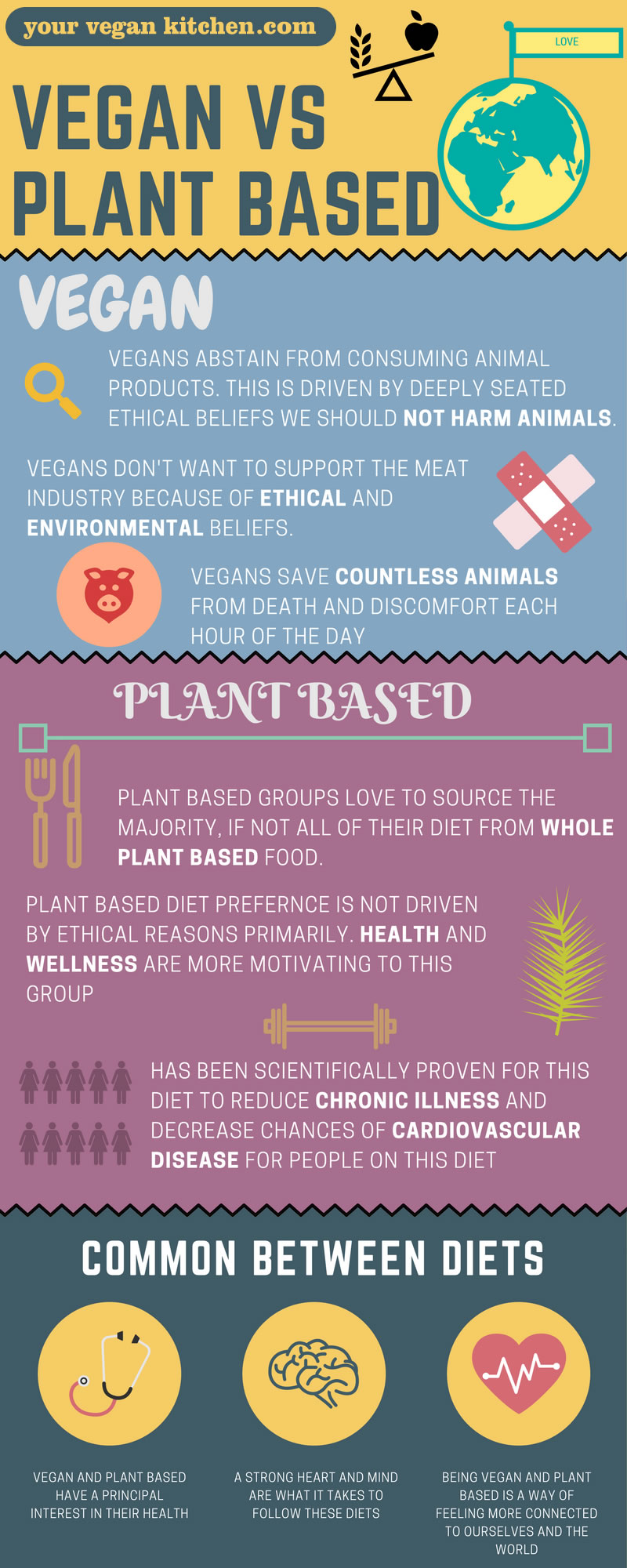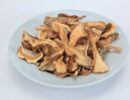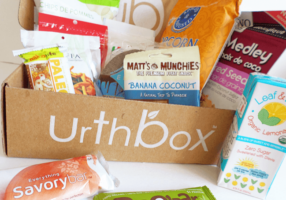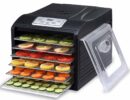Is a plant-based diet the same as a vegan diet? And if the two aren’t one and the same thing, then what exactly sets them apart? In this article, we compare Vegan vs Plant-Based Diets!
Vegan vs Plant-Based: Snapshot
Vegan
- Doesn´t eat animal products
- Won´t consume or use animal products at all. E.g. Honey, Leather Shoes, Cosmetics that have been tested on animals.
- ´Vegan´ is more of a lifestyle than a diet.
- Although many vegans strive to eat a health-conscious diet, there is also the ability to consume processed foods such as Potato Chips, Soft Drinks, and Chocolate
Plant-Based
- Doesn´t eat animal products
- No ethical opposal to consuming animal by-products. E.g. Cosmetics, Leather Shoes, etc
- Many plant-based dieters don´t want to harm animals, however, a big motivator is a healthier, more whole-food-based diet.
- Plant-Based people avoid processed food and opt to eat more whole, unprocessed foods.
Can you be a Plant-Based Vegan?
Absolutely! Let´s look at the topic in more detail. These two terms seem to confuse a lot of people because, to some, “plant-based” is just another way of saying “vegan”. Yet, if you only follow a plant-based diet without the associated politics and ethics of a vegan, it can be so frustrating if at every instance you have to explain to people why and how you’re not a vegan.
What exactly is a plant-based diet?
Come with me and we can — hopefully — exhaust this topic today and put to rest the “war” that has been simmering for years below the surface between plant-based dieters and vegans.
When you encounter the term “plant-based diet” for the first time, without thinking much, it would appear quite self-explanatory: the focus on a diet that revolves around whole-plant extracts like veggies, fruits, legumes, seeds, nuts, and grains.
But plant-based dieting isn’t just about the focus on these and other whole plant foods but also the absence of all animal by-products such as meat, eggs, fish, dairy products, etc. from your diet.
One witty plant-based dieter put it this way:
“if it walks, flies crawls, swims, hops, slithers, jumps, has eyes, a mom and a dad, then don’t eat it!”
So, maybe you’re a bit confused now: does that explanation not also describe a vegan diet in one way or another? If they’re different, what clearly distinguishes a plant-based diet from a vegan diet then?
What is a vegan diet?
It’s true that because a plant-based diet also eliminates animal by-products, many people assume it to be the same thing as the vegan diet. But this is not always the case.
Actually, the scope of vegan dieting can be a little bit different and include other factors like ethics and politics like we hinted in our introduction. In fact, depending on who’s talking, the distinction between plant-based dieting and vegetarian dieting can bring them closer together or set them vastly apart.
Let me elaborate…
A Vegan is a Person Who Adheres to and Practices Veganism
What this means is that in addition to eliminating all animal by-products from their diet, vegans also abstain from the use of all other animal or animal-derived products.
For most vegans, the wearing of silk clothes, fur, and wool jackets and sweaters, as well as leather shoes and jackets is a no-no.
Others go a step further by rejecting commercial products such as paints, polishes, cosmetics, ink, glue, soaps and other house-cleaning products if they’re animal-based. Even products like medicines that are lab-tested on animals are never used by some vegans.
Most vegans, therefore, have a philosophy that’s often associated with their lifestyles: they unequivocally reject the commodity tag that most of the world has put on sentient animals.
All this is because as a way of life, veganism is founded on the principle of ethics and politics of animal rights. In this context, being a vegan involves a personal belief and obligation not to hurt animals or indirectly take part in encouraging any kind of animal cruelty. Most advocators of veganism thus also reject game-hunting for all reasons.
On the other hand, although plant-based dieting can be considered vegan, a person who adheres to such a diet does not necessarily subscribe to veganism as a lifestyle or philosophy. For instance, there are many people who follow plant-based diets yet they still don’t see any problem with wearing leather shoes or silk clothes.
In fact, some plant-based dieters just adhere to this kind of lifestyle for their own health reasons and don’t see any ethical issues with other people slaughtering animals for food or game-hunting tourism.
Still, although the word “vegan” derives from “vegetarian” and was originally meant to mean “vegetable- or plant-based”, its meaning has evolved over time to the extent that today something described as vegan may not necessarily be plant-based.
In fact, “vegan” could just mean the absence of animal by-products like meat, eggs, fish or dairy products without automatically implying “plant-based”. For instance, while an Oreo cookie can be described as “vegan” since it contains no animal by-products, it’s not something we’d refer to as a plant-based meal.
At the least, Oreo cookies are extracts of plant fragments that have undergone extensive processing such that they no longer resemble their mother plant anymore. While “plant-based” generally describes meals that are both healthy and made from whole plant foods, the processed Oreo cookie is in no way equal to the whole grain wheat that it’s made from.
For all intents and purposes, a person could live on highly processed foods, like white bread, French fries, Oreo cookies, and soda yet still call themselves vegan. Yet, such a diet isn’t plant-based at all.
In fact, one can be completely vegan without eating anything that is plant-based or that which looks like a plant.
Even junk foods like fake meat, fizzy drinks, and faux cheese are vegan yet not plant-based. A type of meal or dieting formula can only be described as “plant-based” ONLY if it involves whole plant foods like veggies, fruits, beans, and whole grains, not their processed derivatives.
You could gobble up French fries, Oreo biscuits, imitation meats, as well as all the oils and salts that you can lay your hands on — which are all vegan foods — without ever touching any veggie, fruit or whole grain, and yet proudly shout out your vegan credentials. But your diet isn’t plant-based by any conservative definitions, especially if you’re looking to be healthy! This is one of the main points in the Vegan vs Plant-Based debate.
Summary
A person following a “plant-based” diet strictly consumes plant products like veggies, fruits, legumes, seeds, nuts, and grains, whereas a Vegan is someone who follows a vegan lifestyle. Neither consumes animal products, however, someone following a plant-based diet might still choose to wear clothing derived from animal products, but a vegan would not. On the other hand, a Vegan might choose to eat highly processed foods, that a person following a plant-based diet would not.
To a large extent, ethical veganism is, in fact, a big leap in the right direction. So, even if you’re in this just for the moral and environmental reasons thumbs up to you for the good work!
There you go; I hope I made the distinction clearer for you and others! If you’ve any additions, corrections or sentiments to make, please feel free to share them in our comments section below. I hope you enjoyed this article Vegan vs Plant-Based!

Do you follow a vegan or plant-based diet? We’ve put together a list of the best vegan cookbooks to keep your kitchen game fresh and your taste buds singing!














